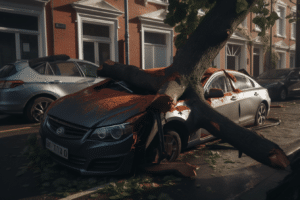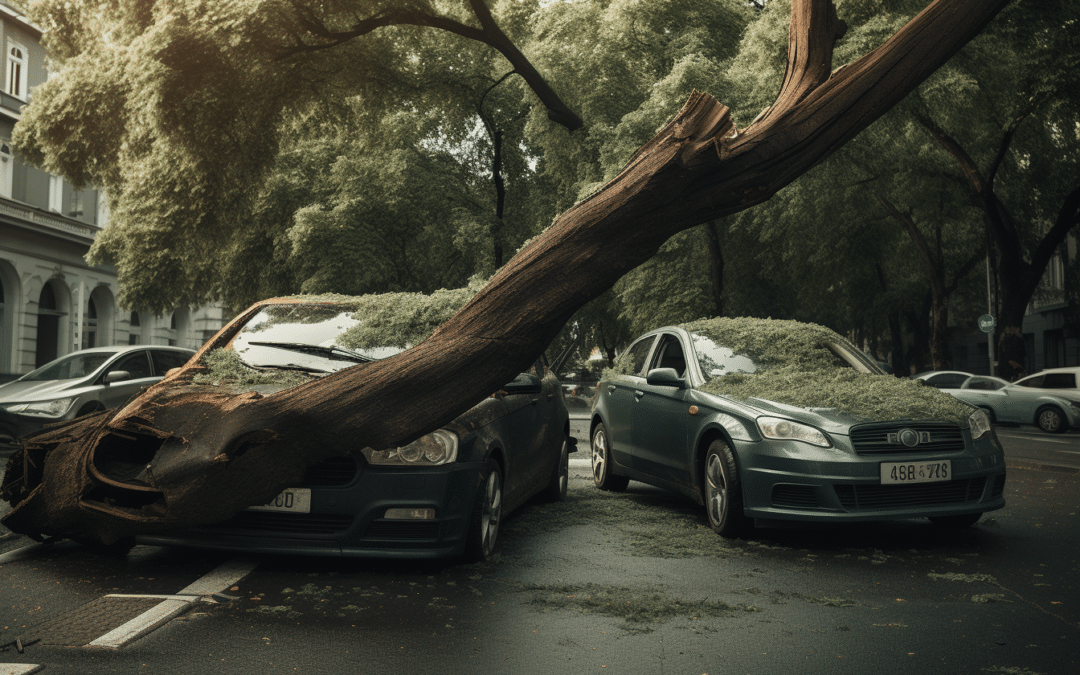When protecting your beloved vehicle, you’ve come to the right place. As a proud car owner, we understand that you want to ensure your prized possession has the best coverage possible.
That’s why knowing the difference between collision and comprehensive coverage is essential – because, let’s face it, we’re all part of this exclusive club of car enthusiasts.
Now, buckle up and join us on this journey as we dive into the nitty-gritty details of these two auto insurance policies. You’ll soon discover which one suits your needs best and boldly drive confidently, knowing that you have made an informed decision for yourself and your cherished ride.
After all, there’s nothing better than cruising down life’s highways with peace of mind by our side!
Exploring Collision Insurance
Exploring collision insurance is like peeling back the layers of an onion, revealing a deeper understanding of how it can protect you and your vehicle. As an insurance agent, I’m here to help guide you through this process so that you feel confident in choosing the right coverage for your needs.
Our shared goal is to ensure that should you ever find yourself dealing with collision claims, you have the support and security of being part of our community.
Collision insurance is explicitly designed to cover damages to your vehicle resulting from an accident where you’re at fault or involved in a hit-and-run incident. This type of coverage will only pay out up to your policy’s specified coverage limits; however, by working together, we can determine the appropriate amount of protection for your unique situation. Knowing these details makes breathing easier, knowing there is a safety net if life throws unexpected curveballs.
Now that we’ve explored the ins and outs of collision insurance let’s look at another key aspect of automotive policies: comprehensive coverage. This next layer offers additional protection beyond basic collision, allowing for even greater peace of mind when navigating life’s highways and byways.
So buckle up as we continue on our journey toward understanding comprehensive insurance!
Understanding Comprehensive Insurance
Now that we’ve discussed the differences between collision and comprehensive coverage, diving deeper into what comprehensive insurance entails is essential. This type of coverage protects your vehicle from damages caused by events other than collisions with another car or object.
events other than collisions with another car or object.
The following list details some common instances where having comprehensive insurance can save you money and provide peace of mind:
- Natural disasters: Damage resulting from earthquakes, floods, hurricanes, tornados, hailstorms, or any other natural catastrophe falls under this category.
- Theft protection: If your car gets stolen or vandalized, comprehensive coverage will reimburse you for its value.
- Animal-related accidents: Collisions with animals such as deer or elk can result in significant damage; fortunately, these incidents are also covered by comprehensive policies.
- Fire and explosions: Your vehicle could be damaged due to a fire breakout or an explosion nearby – don’t worry; comprehensive coverage has got you covered.
It’s crucial to remember that each policy varies based on individual needs and preferences. When selecting a plan tailored just for you, consider factors like the age and condition of your vehicle, potential risks in your geographical area (e.g., frequent storms), and whether theft protection is a priority for you.
By evaluating these aspects thoroughly before deciding, you’ll find yourself among countless others who have made wise choices when securing their automobiles through comprehensive insurance plans.
As we move forward in our journey toward understanding various auto coverages better, let us explore how best to determine the right coverage for your specific vehicle while ensuring all bases are adequately covered without breaking the bank on premiums.
Determining The Right Coverage For Your Vehicle
Did you know that over 70% of drivers need clarification about which insurance coverage suits their car? As an insurance agent, I’m here to help you determine the best protection plan tailored to your vehicle and circumstances.
Let’s dive into some key factors that will affect your decision-making process. Coverage factors are crucial in selecting the appropriate policy for your vehicle protection needs. You’ll want to consider your car’s age, make, model, and overall value.
For example, new or high-end luxury vehicles might warrant both collision and comprehensive coverage due to their higher cost of repair or replacement – this ensures you’re not left with hefty bills should something unfortunate happen on the road. On the other hand, if you own an older car with a lower market value, opting only for liability coverage may suffice since repair costs exceed their worth.
Besides your vehicle’s characteristics, evaluate personal aspects like driving habits and financial situation – are you prone to accidents or live in areas where theft is common? If so, having extra layers of security through comprehensive coverage could provide peace of mind, knowing that these risks are accounted for.
As we explore determining the ideal level of auto insurance coverage for your specific needs, remember that belonging to a community means caring for one another. We all share responsibility for making our roads safe and ensuring each driver adequately protects against unforeseen events. Don’t be part of those statistics who regret not having enough insurance; instead, take charge by adequately evaluating your options and making informed decisions based on facts rather than assumptions alone.
The following section will compare the costs and benefits associated with different types of policies available to find the perfect balance between affordability and comprehensive protection suited just for you.
Comparing Costs And Benefits
Now that you have a clearer understanding of the right coverage for your vehicle, let’s delve deeper into comparing costs and benefits. A well-rounded assessment involves weighing various insurance policies’ financial implications and security.
This includes looking at how collision and comprehensive coverage stack against each other regarding cost comparison and benefit analysis. To make this process as straightforward as possible, here are some key points to consider when evaluating these two types of coverage:
- Premiums: Comprehensive coverage often has lower premiums than collision since it covers less frequent events such as theft or natural disasters.
- Deductibles: Collision may come with higher deductibles, meaning you’ll pay more out-of-pocket before your policy kicks in after an accident.
- Coverage scope: While comprehensive covers non-collision-related incidents like theft or vandalism, collision protects accidents involving another vehicle or object.
- Vehicle value: If your car is older or has a low market value, it might be practical to opt for comprehensive cover collision due to its wider range of covered situations and lower premium rates.
- Risk factors: Your driving habits, location, and personal risk tolerance should play a role in deciding which type of coverage best suits your needs.
When comparing different insurance coverages, always remember that cheaper is sometimes better. It’s essential to thoroughly analyze the benefits offered by each policy option rather than merely focusing on price alone.
By examining all aspects of the available plans – from their respective costs to the extent of protection they provide – you can gain valuable insights into which one aligns most closely with your unique requirements and preferences.
As we talk about making an informed decision about auto insurance policies, please keep these cost comparisons and benefit analyses in mind so you’re equipped with the necessary knowledge for selecting the ideal plan tailored for you.
Making An Informed Decision
Coverage misconceptions insurance myths – they’re everywhere. Friends tell us one thing, family members say another, and the internet is a labyrinth of information that can lead you astray. With so many competing voices, it’s no wonder people feel overwhelmed when choosing between collision and comprehensive coverage.
As your trusted insurance agent, I aim to help you cut through the noise and make informed decisions that best suit your needs. Firstly, let’s debunk some common insurance myths. One prevalent misconception is that red cars cost more to insure; this isn’t true. Insurance companies don’t factor in the color of your vehicle when determining rates.
Another myth worth addressing is that purchasing minimum liability coverage protects you in all situations. While it may be tempting to save money by skimping on coverage, doing so could leave you financially vulnerable if you’re involved in a severe accident or suffer significant damage to your car from theft or natural disasters.
Now that we’ve cleared up these misconceptions think about what type of driver you are and how much risk exposure you have daily. Do you travel long distances regularly? Is your area prone to severe weather conditions? How valuable is your car? Asking yourself these questions will help determine whether investing in collision and comprehensive coverage makes sense for your unique situation.
Remember: there’s no one-size-fits-all solution – but with accurate information at hand and guidance from yours truly, together we’ll create an insurance plan designed specifically for YOU!
Frequently Asked Questions
What Happens If I Am Involved In A Hit-And-Run Accident, And Which Type Of Coverage Will Protect Me In This Situation?
Experiencing a hit-and-run accident can be incredibly stressful, but don’t worry – we’ve got you covered!
Hit-and-run prevention is not always possible, so knowing your coverage limitations is essential before such an incident occurs. In the unfortunate event of a hit-and-run, collision coverage will typically protect you by covering damages to your vehicle caused by another driver who flees the scene.
Our insurance policies are designed with our customers in mind, ensuring you’ll feel secure knowing you belong to a community of drivers protected from unpredictable situations like this one.
So sit back, relax, and drive confidently, knowing we’re here for you if a hit-and-run ever impacts your life.
Can I Choose To Have Only Collision Or Comprehensive Coverage, Or Is It Necessary To Have Both Coverages For My Vehicle?
As your trusted insurance agent, I understand that feeling secure and protecting what matters most to you is essential.
The good news is that choosing collision or comprehensive coverage individually is possible based on your needs and preferences.
There’s no strict necessity for having both coverages simultaneously; however, considering the unique benefits offered by each can help ensure a well-rounded protection plan for your beloved vehicle.
Collision coverage takes care of damages from accidents involving another car or object, while comprehensive provides broader benefits such as protection against theft, vandalism, natural disasters, and animal-related incidents.
So tailor your policy to fit seamlessly into your life – because being part of our insurance family means we’ve always got your back!
How Does The Deductible Amount I Choose For Collision And Comprehensive Coverage Impact My Insurance Premium And Out-Of-Pocket Expenses?
Did you know that raising your deductible from $500 to $1,000 can save you up to 9% on your insurance premium?
When choosing collision and comprehensive coverage deductible strategies, finding the right balance between lower premiums and manageable out-of-pocket expenses is essential.
A higher deductible will generally result in a lower premium; however, you’ll need to pay more upfront if an accident occurs.
On the other hand, a lower deductible could lead to higher premiums but less financial stress when filing a claim.
Ultimately, the best approach depends on your unique needs and budget – consider conducting a premium comparison with various deductibles to see which option suits you best.
Remember, we’re all part of this journey together, and our goal is to help ensure you have peace of mind knowing you’ve made informed decisions about protecting your vehicle.
Are There Any Specific Scenarios Where My Insurance Company Might Refuse To Cover Damages Under My Collision Or Comprehensive Policy?
Please know specific scenarios where your insurance company won’t be able to cover damages under your collision or comprehensive policy.
Some standard, comprehensive exclusions and collision misconceptions can leave you feeling left out when it comes time to file a claim.
For instance, the insurer may. Please don’t hesitate to deny coverage if your vehicle is negligent or lacks maintenance. Similarly, coverage could also be rejected if an unauthorized driver was behind the wheel during the incident.
Furthermore, most policies do not cover intentional damage or illegal activities like street racing.
As your trusted insurance agent/broker, we’re here to help clarify any uncertainties and ensure you feel included in our community of well-informed and protected policyholders.
How Does My Vehicle’s Age, Make, And Model Affect The Decision To Opt For Collision And Comprehensive Coverage, And Are There Any Specific Recommendations For Older Or Luxury Vehicles?
When considering collision and comprehensive coverage, vehicle factors such as age, make, and model play a significant role in your decision-making process. Luxury recommendations for older or high-end cars may differ from those for newer or more affordable vehicles.
As an insurance agent/broker, I understand you want to feel secure and confident in protecting your cherished ride. For older vehicles with lower market value, it might be worth evaluating if the cost of these coverages outweighs their potential benefits. In contrast, luxury models often warrant higher levels of coverage due to their increased repair costs and desirability to thieves.
Ultimately, tailoring your policy to suit your needs ensures peace of mind while fostering a sense of belonging among fellow car enthusiasts who share concerns about safeguarding their prized possessions.
Conclusion
As you navigate the winding roads of life’s journey, let your trusty insurance shield protect you from unforeseen obstacles.
Collision and comprehensive coverage are like two sides of this shield, safeguarding your vehicle against various perils.
Remember, my dear friends, choosing the right balance between these coverages is crucial to ensure a smooth ride.
Please look at your car’s age and value while selecting appropriate deductibles.
We want to be your guiding light in making informed decisions for a secure future on the road ahead.


